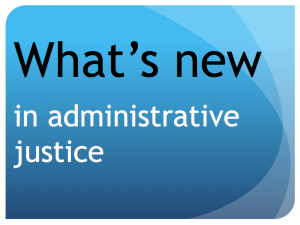In the first of a regular feature on the UKAJI blog, we bring together news, developments, events and publications related to administrative justice. To suggest an item for future “What’s new” posts, please email ukaji@essex.ac.uk.
Parliament
The Local Government (Review of Decisions) Bill was debated by the House of Commons Public Bill Committee on 21 January 2015. A new right of appeal (actually an internal review) is proposed against local authority decisions to restrict a member of the public, charity or other group from holding an event on health and safety grounds.
The House of Commons Health Committee published its 4th report of the 2014-15 session: Complaints and Raising Concerns on 13 January 2015. It examines and makes recommendations about complaint handling by health and social care bodies.
The House of Commons Public Administration Select Committee (PASC) has launched an inquiry into how clinical failure and complaints are handled in the NHS, considering how clinical failure in the NHS is investigated—and how subsequent complaints are handled. There is suggestion, PASC say, of too much focus on apportioning blame and avoiding litigation, and not enough on learning and improving.
The Institute for Government has published a briefing note on Parliamentary scrutiny of government.
Judicial review
How many JRs are there against government departments? The LSE’s British Politics and Policy blog has good piece about the number of judicial reviews against central government (following debate on 1 December 2014 in which Chris Grayling MP, the Justice Secretary, was asked but couldn’t give figures). Another piece examining the figures is here.
The Divisional Court has rejected a judicial review claim by Rights of Women, challenging the lawfulness of the evidence criteria for legal aid applications for family proceedings involving victims of domestic violence.
Tribunals
In December 2014 the Ministry of Justice published statistics for the Special Educational Needs and Disability Tribunal.
Ombuds
The Local Government Ombudsman (LGO) has published a special report on lessons learned from complaints about local authority planning and development decisions. The report sets out the legal background for planning and development decision-making by local authorities and the process to challenge those decisions. It also presents case studies and proposes areas of good practice for councils. The report is a good example of using complaints to identify wider lessons that can lead to improvements in service and decision-making. Hopefully the LGO will monitor whether local authorities are adopting the good practice guidance.
The Parliamentary and Health Service Ombudsman Service (PHSO) is seeking feedback on its service to help develop its service charter. The service charter will be a set of promises to individuals and bodies in jurisdiction, designed to create a modern and responsive service. A website has been set up to capture views and opinions through an online survey.
A recent survey of the International Ombudsman Institute found that 71% of ombudsmen have the power to initiate an investigation without a specific complaint (‘own initiative powers’). The survey aimed at finding out more about how offices decide on topics for such own initiative investigations, how they ensure the recommendations resulting from such investigations are implemented and if offices collaborate with other oversight and/or regulatory bodies when undertaking such own initiative investigations.
Human rights
The Equality and Human Rights Commission has published a guide on human rights for public authorities, including Regulators, Inspectorates and Ombudsmen (RIOs), which have an obligation to comply with the Human Rights Act 1998 (HRA), and case law has clarified that they also have positive obligations to promote and protect human rights when carrying out public functions.
Appeals
The Department of Health has launched a consultation on the cap on care costs and appeals. ‘The proposals are at an earlier stage of development as they were introduced to the Care Act as a result of debates as it passed through Parliament. We are therefore seeking views on the need for a new system and on policy proposals rather than regulations and guidance in this consultation.’

Discussion
No comments yet.